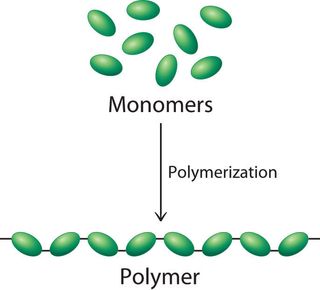Discovering the Varied Applications and Advantages of Polymers in Different Industries
Polymers, with their diverse series of homes and performances, have become essential in numerous industries, each enjoying unique gain from their application. Polymers. From enhancing safety and security and performance in the automotive market to revolutionizing clinical gadgets in the health care sector, polymers play a critical duty. Their environmentally friendly nature is changing the landscape of sustainability practices. As we delve into the midsts of polymers in electronics, we discover sophisticated developments, while their structural honesty transforms the realm of construction and infrastructure. The prevalent impact of polymers across markets is a testimony to their versatility and adaptability, forming the future of many industries.
Automotive Industry Applications
Polymers play a critical function in boosting the performance and longevity of different components within the automotive market. These versatile products are thoroughly made use of in the production of different components, ranging from indoor elements to under-the-hood applications. One noticeable use polymers in the automotive sector remains in the manufacturing of lightweight components. By replacing standard metal components with polymer-based options, automobiles can achieve improved gas efficiency without compromising on strength or security.

Medical Care Industry Benefits
In different health care applications, the benefits of making use of polymers are widely identified for their diverse series of valuable properties. Polymers play a crucial function in the medical care industry as a result of their flexibility, biocompatibility, and cost-effectiveness. Among the key advantages of polymers in healthcare is their ability to be customized to specific needs, such as flexibility, sturdiness, and biodegradability, making them suitable for a wide variety of clinical applications.
Polymer-based products are extensively used in clinical gadgets, such as catheters, implants, prosthetics, and medication distribution systems, as a result of their biocompatibility and capability to simulate natural tissues. These materials can decrease the threat of allergies or denials, improving patient safety and end results. Additionally, polymers are light-weight, making them appropriate for wearable clinical gadgets and ensuring individual comfort.
Moreover, polymers allow the advancement of cutting-edge therapy methods, such as hydrogels for cells design and nanocomposites for targeted medication shipment. Their ease of processing and sanitation makes them necessary for preserving high requirements of hygiene in healthcare setups. In general, the diverse benefits of polymers add considerably to developments in clinical modern technology and person care.
Ecological Advantages of Polymers

Moreover, polymers can contribute to power cost savings as a result of their lightweight nature. In sectors such as transportation, lightweight polymer materials can help look at this site in reducing fuel intake and greenhouse gas exhausts. Additionally, polymers can make it learn this here now possible for the advancement of energy-efficient items such as insulation materials that improve energy preservation in structures.
In addition, polymers play a critical role in lowering water pollution. The usage of polymer-based purification systems can efficiently eliminate toxins and contaminants from wastewater, securing water resources and ecological communities. In general, the environmental benefits of polymers make them useful possessions in advertising sustainability and environment-friendly techniques across different industries.
Polymers in Electronics and Modern Technology
Thinking about the raising demand for ingenious and sustainable options in modern-day industries, the assimilation of advanced polymer technologies in the realm of electronics and innovation has actually arised as a pivotal technique for driving effectiveness and efficiency. Polymers have transformed the electronic devices industry by allowing the production of lighter, more flexible, and long lasting electronic gadgets. From smartphones to medical tools, polymers play a crucial function in boosting item layout and functionality.
One significant advantage of polymers in electronics is their protecting properties, which aid secure delicate digital parts from ecological aspects and electric disturbance. Furthermore, polymers are essential in the advancement of versatile display screens, wearable modern technology, and printed electronics, offering unlimited opportunities for developing smart and interconnected gadgets.
Moreover, the use of polymers in digital product packaging has actually led to innovations in miniaturization and thermal administration, improving the overall performance and dependability of digital systems. As technology remains to advance, the convenience and adaptability of polymers will most certainly drive better technology in the electronic devices market, shaping the future of modern technology.
Duty of Polymers in Building and Facilities
Polymers provide many benefits in the construction industry due to their convenience, longevity, and cost-effectiveness. One crucial duty of polymers in building and construction is their use in coverings and sealers, supplying defense versus environmental elements such as moisture, UV radiation, and corrosion.
In addition, polymers play an essential duty in sustainable building practices by enabling the advancement of energy-efficient frameworks. Shielding materials made from polymers aid regulate interior temperature levels, minimizing the requirement for home heating and cooling this hyperlink systems and inevitably reducing energy consumption. The use of polymer-based compounds in facilities jobs such as bridges and roads enhances their longevity and lowers maintenance prices. On the whole, the consolidation of polymers in building and construction and infrastructure showcases their substantial impact on contemporary engineering techniques.
Conclusion
To conclude, polymers play an essential duty in different markets such as automobile, healthcare, ecological, electronics, and construction. Their functional homes make them beneficial in producing cutting-edge options and items. From enhancing gas effectiveness in automobiles to boosting medical devices, polymers supply countless advantages. Additionally, their influence on decreasing waste and advertising sustainability highlights their significance in modern-day applications. The widespread use of polymers demonstrates their substantial payment to progressing modern technology and enhancing top quality of life.